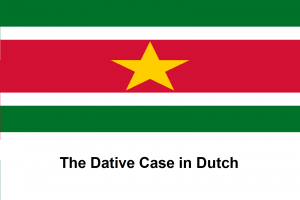Difference between revisions of "Language/Dutch/Grammar/The-Dative-Case-in-Dutch"
Jump to navigation
Jump to search
m (Quick edit) |
m (Quick edit) |
||
| Line 1: | Line 1: | ||
[[File:The Dative Case in Dutch.png|alt=The Dative Case in Dutch|thumb|The Dative Case in Dutch]] | [[File:The Dative Case in Dutch.png|alt=The Dative Case in Dutch|thumb|The Dative Case in Dutch]] | ||
Hello everybody, | Hello everybody, | ||
| Line 13: | Line 10: | ||
Feel free to edit this page by adding new words and expressions! | Feel free to edit this page by adding new words and expressions! | ||
Happy learning! :) | |||
. | |||
<span link>Consider broadening your understanding by checking out these related lessons:</span> [[Language/Dutch/Grammar/Future-Tense|Future Tense]], [[Language/Dutch/Grammar/Conditional-Mood-in-Dutch|Conditional Mood in Dutch]], [[Language/Dutch/Grammar/Indefinite-Articles-in-Dutch|Indefinite Articles in Dutch]] & [[Language/Dutch/Grammar/Accent-Marks-and-Stress|Accent Marks and Stress]]. | |||
{| class="wikitable" | {| class="wikitable" | ||
|'''<big>THE DATIVE CASE</big>''' | |'''<big>THE DATIVE CASE</big>''' | ||
| Line 94: | Line 92: | ||
|} | |} | ||
== | ==Other Lessons== | ||
* [[Language/Dutch/Grammar/Pronouns|Pronouns]] | * [[Language/Dutch/Grammar/Pronouns|Pronouns]] | ||
* [[Language/Dutch/Grammar/Genitive-Case-in-Dutch|Genitive Case in Dutch]] | * [[Language/Dutch/Grammar/Genitive-Case-in-Dutch|Genitive Case in Dutch]] | ||
| Line 105: | Line 103: | ||
* [[Language/Dutch/Grammar/How-to-use-“can”-in-Dutch|How to use “can” in Dutch]] | * [[Language/Dutch/Grammar/How-to-use-“can”-in-Dutch|How to use “can” in Dutch]] | ||
* [[Language/Dutch/Grammar/Greetings-in-Dutch|Greetings in Dutch]] | * [[Language/Dutch/Grammar/Greetings-in-Dutch|Greetings in Dutch]] | ||
<span links></span> | |||
Latest revision as of 23:20, 26 March 2023
Hello everybody,
In today's lesson you will learn THE DATIVE CASE in Dutch.
Feel free to edit this page by adding new words and expressions!
Happy learning! :)
Consider broadening your understanding by checking out these related lessons: Future Tense, Conditional Mood in Dutch, Indefinite Articles in Dutch & Accent Marks and Stress.
| THE DATIVE CASE | O CASO DATIVO | |
| ENGLISH | DUTCH | BRAZILIAN PORTUGUESE |
| For (something) or (somebody) | Para (alguma coisa) ou (alguêm) | |
| To (some place) | Para (algum lugar) | |
| FOR ONE HOUSE | VOOR EEN HUIS | PARA UMA CASA |
| FOR THE HOUSE | VOOR HET HUIS | PARA A CASA |
| FOR SOME HOUSES | VOOR ENKELE HUIZEN | PARA ALGUMAS CASAS |
| FOR THE HOUSES | VOOR DE HUIZEN | PARA AS CASAS |
| FOR ONE MAN | VOOR EEN MAN | PARA UM HOMEM |
| FOR THE MAN | VOOR DE MAN | PARA O HOMEM |
| FOR SOME MEN | VOOR ENKELE MANNEN | PARA ALGUNS HOMENS |
| FOR THE MEN | VOOR DE MANNEN | PARA OS HOMENS |
| I GAVE MY WATER TO THE DOG | IK GAF MIJN WATER AAN DE HOND | EU DAVA MINHA ÁGUA PARA O CÃO |
| I WILL GO TO THE BEACH | IK ZAL NAAR HET STRAND GAAN | EU IREI À PRAIA |
Other Lessons[edit | edit source]
- Pronouns
- Genitive Case in Dutch
- Ordinal Numbers in Dutch
- How to use “must” in Dutch
- The Accusative Case in Dutch
- Indefinite Articles in Dutch
- The Instrumental Case in Dutch
- How to Use Be
- How to use “can” in Dutch
- Greetings in Dutch
